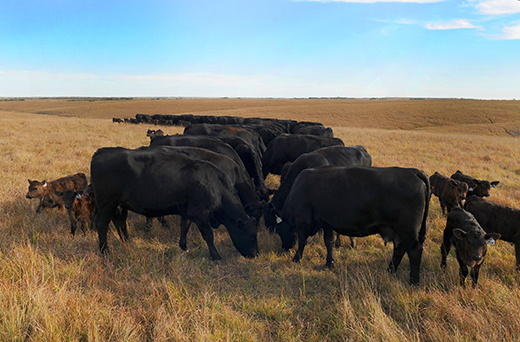Registration opens for international livestock conference at Kansas State University
Wednesday, April 3, 2019

Kansas State University will be the first U.S. host of the Global Agenda for Sustainable Livestock Multi-Stakeholder Partnership Meeting Sept. 9-13. The U.N. organization's annual meeting gathers leaders from government, NGOs, academia and industry to discuss innovative approaches to sustainable livestock production | Download this photo.
MANHATTAN — Invitations are being sent around the world for high-profile leaders to travel to Kansas State University in September to help shape the future of livestock production.
Livestock producers worldwide face complex questions about innovating in sustainable ways to meet growing global demand. Those questions deal with feeding nearly 10 billion people in the coming decades, environmental stewardship, business concerns, dependable systems for grain and feed, disease prevention, technology adaptation and more.
The Global Agenda for Sustainable Livestock, or GASL, annually convenes Multi-Stakeholder Partnership Meetings to initiate open discussions from varied perspectives so these questions can be answered.
Hosted by the United Nations' Food and Agriculture Organization based in Rome, GASL shares good practice and policy and promotes the sustainability of the global livestock and agri-food sector. Its main principle is that all livestock production systems can be more sustainable, no matter where they are.
GASL's ninth Multi-Stakeholder Partnership Meeting, titled "Innovation in Sustainable Livestock Systems," will take place in Manhattan Sept. 9-13 to discuss science and policy around four sustainability domains, with plenary sessions for each that will be open to the public: Food Security and Nutrition, Livelihoods and Economic Growth, Animal Health and Welfare, and Natural Resources and Climate.
More than 350 invited attendees from around the world are expected to attend, making Manhattan the epicenter of the global livestock industry for the week. This year will mark the first time this meeting of influential political leaders, industry executives, NGO representatives and academics will be conducted in the United States and the first time it will be hosted by a university.
"Innovations are key to maintain and further improve sustainability in livestock-based value chains," said Fritz Schneider, chair of the Global Agenda for Sustainable Livestock. "Kansas State University is an important innovator both in the USA and globally. GASL is privileged to partner with K-State for its ninth Multi-Stakeholder Partnership Meeting in September 2
Anyone with an interest in sustainable livestock systems is welcome and encouraged to attend. Non-members of GASL may register and attend the meeting as well.
The schedule for the Manhattan event includes a specific focus for each day:
• Monday, Sept. 9, Science Day — featuring plenary sessions on GASL's four sustainability domains.
• Tuesday, Sept. 10, Policy Day — roundtable discussions and panels.
• Wednesday, Sept. 11, Field Tours — five tours of regional agricultural production operations.
• Thursday, Sept. 12, Action Day — action plan discussion, guiding group meeting and closing ceremony.
• Friday, Sept. 13, Business Meetings — closed member meetings, planning for next events.
With discussions centering on this year's theme, attendees will share perspectives on how innovation goes beyond the invention and development of technologies to include economic, behavioral, technical and policy aspects of bringing new approaches to bear on the issue of sustainable livestock systems.
All eight previous meetings over the last seven years were organized by the host countries' governments. Last year's meeting was in Ulaanbaatar, Mongolia. Previous meetings were in Ethiopia, Panama, Colombia, Canada, Kenya, Thailand and Brazil.
Because of livestock's primary importance to the lives and livelihoods of people in developing counties, much of GASL's work is focused on smallholder and even subsistence farming. With a university in the heartland of the U.S. hosting this year's event, some of the information sharing will include demonstrating how larger-scale livestock operations incorporate sustainable innovations and how those practices can be adapted and adopted.
"Sharing innovations, from on-the-farm practices to genetics and technology, will allow us to collectively meet a growing world demand for animal-sourced proteins while balancing the protection of natural resources, ensuring a safe food supply, and protecting animal health and welfare," said Ernie Minton, interim dean of the university's College of Agriculture.
The university's standing as a leader in agricultural research and its collaborative efforts all over the world already have made it a recognizable destination for GASL participants.
"The strong roots of many of the Kansas State University faculty in practical livestock production makes a dialogue between the university and civil society organizations very valuable," said Pablo Frere, a member of the GASL guiding group and a coordinator for Redes Chaco in Argentina.
Another member of the GASL guiding group, Marcelo Gonzalez, vice minister of livestock in Paraguay's Ministry of Agriculture, said his country is committed to specific actions to keep its livestock production sustainable. "In tune with the existing academic agreement between Kansas State and Paraguay, the Multi-Stakeholder Partnership meeting will lead to many important innovations in livestock production in Paraguay," he sai
